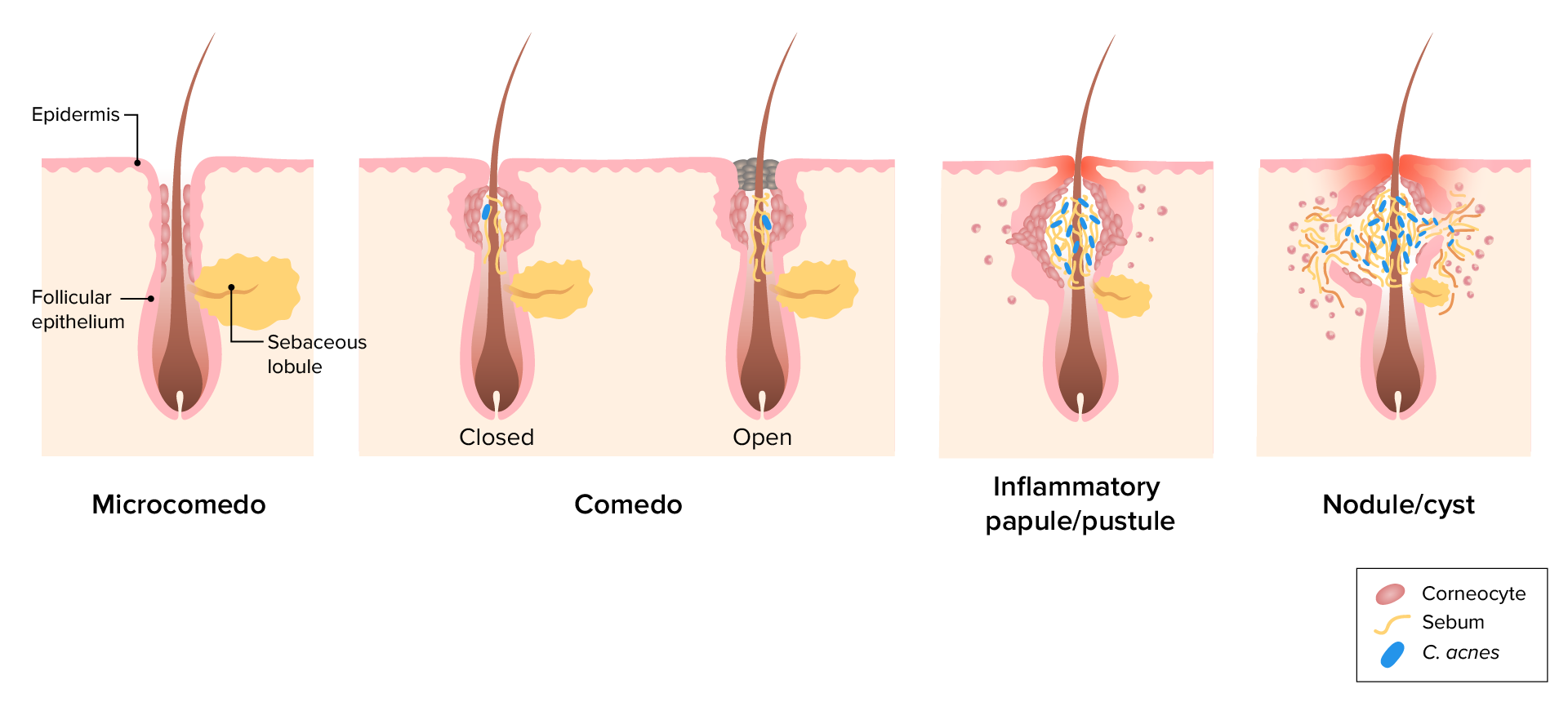Playlist
Show Playlist
Hide Playlist
Quick Review: Acne
-
Slides Disorders of sebaceous and apocrine glands.pdf
-
Reference List Dermatology.pdf
-
Download Lecture Overview
00:01 Alright, having talked about that last case, let's go on to a few review questions. 00:05 I'll ask the question, you could pause the screen and when you're ready for the answer, unpause it. 00:10 First off, which of the following is true regarding acne rosacea and acne vulgaris? Alright, both acne vulgaris and acne rosacea are commonly associated with comedones. 00:30 No. 00:30 And I really want to highlight that point. 00:32 Comedones are a disease seen in acne vulgaris, and less commonly with hidradenitis suppurativa, but not acne rosacea. 00:39 Number 2. 00:40 Acne vulgaris is commonly exacerbated by spicy foods and alcohol. 00:45 That should make you think of acne rosacea not acne vulgaris. 00:48 So that one's also false. 00:50 Number 3. 00:51 Acne rosacea is a disease of adolescence. 00:54 Not really, it's more in women who are in their 30's and 40's. 00:58 Number 4. 00:59 Telangectasias are commonly seen with acne vulgaris. 01:03 No, that's really something seen with acne rosacea. 01:06 And lastly, rhinophyma is a late manifestation of acne rosacea. 01:11 That's true, particularly when you see the disease in men. 01:14 So our answer to this question is number 5. 01:17 Alroght, next and last question. 01:19 Which of the following is an appropriate treatment? Alright, so rosacea. 01:31 You don't treat rosacea with TNF alpha inhibitors. 01:34 You're probably gonna use something like topical metronidazole. 01:37 Number 2. 01:38 Acne vulgaris, first line treatment with topical clindamycin That's actually completely reasonable, you could use either topical clindamycin or benzoyl peroxide. 01:47 So that's gonna turn out to be our answer. 01:49 Number 3. 01:50 Hidradenitis suppurativa You wouldn't really start with topical brimonidine, it's not gonna be an effective treatment at all. 01:56 Initial management typically includes topical clindamycin or oral tetracyclines, with possible addition of metformin or hormonal therapies (like spironolactone in women). For moderate-to-severe disease, anti-TNF and IL-17 inhibitors are now preferred over older treatments like isotretinoin, with intralesional corticosteroids used for acute flares. While surgical intervention remains important, routine incision and drainage is actually discouraged as it may promote recurrence. 02:26 For acne vulgaris, first line therapy with isotretinoin? That would be a pretty big gun to start with. 02:32 Again, that's that medicaton which is extremely effective but has known teratogenecity. 02:38 And lastly, acne rosacea. 02:40 You wouldn't start with topical corticosteroids. 02:42 In fact, there's some evidence that topical corticosteroids can exacerbate acne rosacea. 02:47 And with that, we've covered our topic today.
About the Lecture
The lecture Quick Review: Acne by Stephen Holt, MD, MS is from the course Miscellaneous Skin Disorders.
Included Quiz Questions
Which of the following is true regarding acne vulgaris?
- Topical clindamycin is considered first-line treatment.
- Isotretinoin is the best first-line treatment.
- Telangiectasias are commonly seen in acne vulgaris.
- Acne vulgaris is often triggered by alcohol and sun exposure.
- Acne vulgaris is common in females in their 30s and 40s.
Customer reviews
5,0 of 5 stars
| 5 Stars |
|
5 |
| 4 Stars |
|
0 |
| 3 Stars |
|
0 |
| 2 Stars |
|
0 |
| 1 Star |
|
0 |




